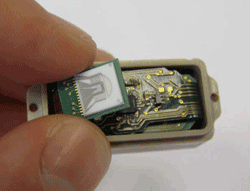A sensor implant may help in monitoring tumors that can’t be operated on or that grow slowly
A team of medical engineers at Technische Universitaet Muenchen (TUM) has developed an electronic sensor chip that can determine the oxygen content in a patient’s tissue fluid. This promises the future use of chip implants that would monitor tumors that can’t be operated on or that grow slowly.
The data retrieved by the sensor implant can then be wirelessly transmitted to the patient’s doctor to support the choice of therapy. When a drop in oxygen occurs in the tissue surrounding the tumor the doctor will know that the tumor might be growing faster and can arrange for an operation or refer therapies, such as chemotherapy. The tumor can now be constantly monitored and this can reduce required check-up appointments.
The main concern for the researchers when developing this chip was that they had to make sure that the sensor would function entirely autonomously for long periods of time. It also must continue to monitor and deliver accurate values even when protein contamination or cell debris is present. Another concern is that it has to be invisible to the body so that it is not identified as a foreign object, attacked, and encapsulated in tissue. The sensor chip, as well as the analysis electronics, transmitter, and batteries are enclosed in a biocompatible housing.

The sensor chip and electronics have a compact footprint — less than twice the size of a thumbnail. However, the package must be made even smaller before it can be implanted in cancer patients using minimally invasive surgery.
The researchers are also looking into adding additional sensors that would be used for measuring acidity and temperature. They are also looking into adding a tiny medication pump, to be implanted with the sensor chip, that would be used to release chemotherapeutic agents directly to the tumor.
The sensor chip has currently passed laboratory tests with cell and tissue cultures. Of course, before moving to the next phase, the sensor has to pass trials in animals. For more info you can contact Sven Becker — the engineer and project manager for this development — at sven.
or at 49 (0)89 2000 110-54.
Christina Nickolas
Advertisement
Learn more about Electronic Products MagazineTechnische Universitaet Muenchen





